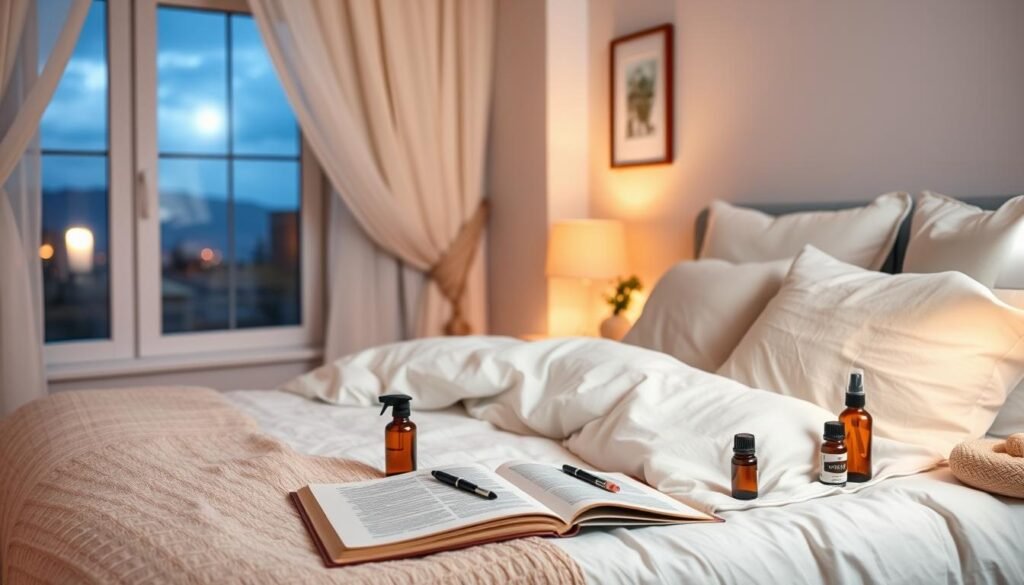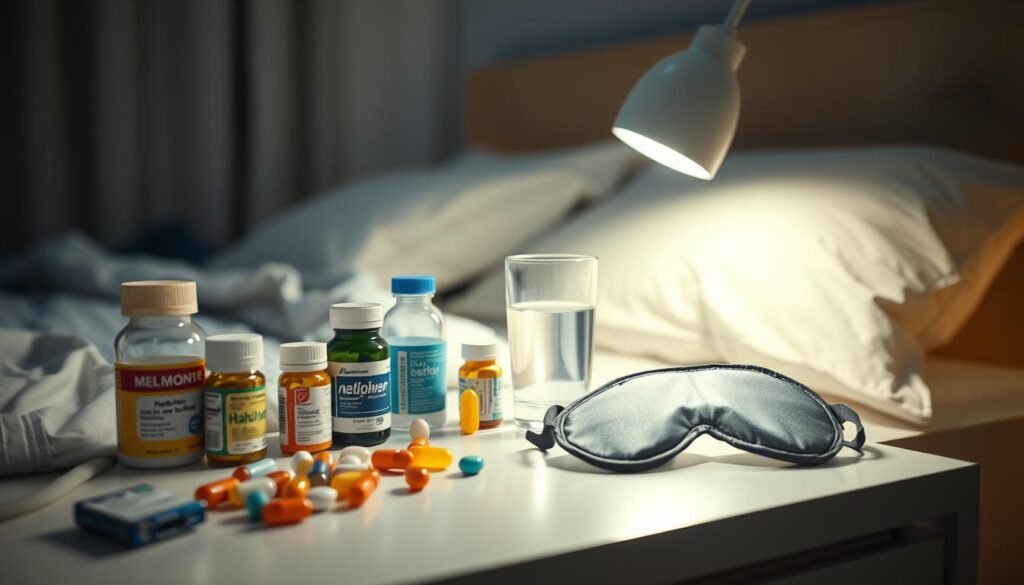Did you know that three out of four people with bipolar disorder face sleep problems? They see it as a sign that a manic episode is coming. This fact shows how closely bipolar disorder and sleep issues are related. This includes bipolar insomnia too. For those dealing with bipolar disorder, insomnia is more than a small bother. It can make mood swings worse and harm mental health.
This guide explores bipolar insomnia, its symptoms, and how to improve sleep. Knowing how sleep problems impact bipolar disorder helps manage moods and sleep better. There are many ways to tackle this, like medication, non-drug methods, and lifestyle changes. Making these changes can improve life for those with bipolar insomnia.
Key Takeaways
- Three out of four people with bipolar disorder may experience sleep problems as a precursor to manic episodes.
- Common treatments include cognitive behavioral therapy for insomnia (CBT-I) and various medications.
- Sleep disturbances can persist even when mood is stable in 70% of bipolar disorder patients.
- Establishing a regular sleep routine and enhancing sleep hygiene can improve sleep quality.
- Bright light therapy and melatonin can help mitigate sleep disturbances caused by medications.
Understanding Bipolar Disorder and Sleep Disturbance
Bipolar disorder is a long-term mental health issue. It flips between extreme happiness and deep sadness. People with this problem often have trouble sleeping. They might sleep too little during high energy times or too much when feeling very sad. This mix-up of sleep and mood can make treating the disorder hard. It can also hurt how well they live their lives.
Many studies show that sleeping problems are common in those with bipolar disorder. For example, these individuals have worse sleep quality than people without the disorder. They get a score of 5.52 on a sleep test, showing they struggle a lot with sleep. Good sleep is essential for controlling mood swings.
Also, these patients’ body clocks are off. They release sleep hormones earlier and have less regular sleep than others. This can make mood problems worse. It leads to more ups and downs in their feelings.
To help, it’s important to understand how sleep issues affect those with bipolar disorder. Keeping a regular sleep schedule helps control moods. Messed up sleep can make symptoms worse. Treatments like talk therapy and sleep therapy are key. They help in fixing sleep problems. This improves mood and quality of life.
What is Bipolar Insomnia?
Bipolar insomnia includes sleep issues faced by those with bipolar disorder. These can involve trouble falling and staying asleep, and irregular sleep patterns. Sleep troubles and mood shifts are closely linked. The kind of sleep problem often changes with manic or depressive states.
In manic times, people might not feel the need to sleep much. But in depressive periods, they may suffer more from insomnia, which affects their health. The connection between bipolar insomnia and sleep issues shows how vital good sleep is in handling the disorder. Lack of sleep can even start manic or depressive periods, making things harder.
To manage bipolar insomnia well, getting proper help is key. Seeing a sleep medicine expert can offer the right advice. Treatments like cognitive behavioral therapy can help with sleep troubles. Also, sticking to a regular bedtime and wake-up schedule can better sleep quality.
Keeping a sleep diary helps track what affects sleep. It’s important to avoid things like nicotine before going to bed. Exercise is good for bipolar symptoms but don’t do intense workouts too close to bedtime.
Bright light therapy can help fix sleep cycles, which is especially good for severe sleep issues. Noting that 25 to 65 percent during manic phases face these issues shows the need for good sleep strategies. By focusing on sleep health, people can better manage bipolar disorder and improve their lives. For more details, further research is helpful regarding the importance of the sleep-wake cycle.
Symptoms of Bipolar Insomnia
Understanding bipolar insomnia’s symptoms is crucial. It helps both people with the condition and their doctors. Those with bipolar disorder often face insomnia and hypersomnia, each affecting health in unique ways. It’s vital to identify these sleep problems to distinguish them from other sleep issues.
Insomnia vs. Hypersomnia
Insomnia makes falling or staying asleep hard. It leads to daytime tiredness and trouble thinking clearly. Studies show that up to 80% of people with bipolar disorder might suffer from insomnia. This can harm their mood and overall health. On the other hand, hypersomnia causes too much sleep, particularly during times of depression, impacting up to 78% of sufferers. The relationship between too little and too much sleep shows the complex issues of sleep disturbances in bipolar disorder.
Other Sleep Pattern Abnormalities
Those with bipolar disorder also face different sleep problems. Issues like disrupted circadian rhythms, including delayed sleep phase syndrome, cause extreme tiredness during the day and irregular sleep patterns. REM sleep problems, including nightmares and sleep apnea, add to the challenges. These difficulties don’t just alter sleep quality; they can also make mood disorder symptoms worse, emphasizing the urgency of treating sleep issues.
| Type of Sleep Issue | Description | Prevalence in Bipolar Disorder |
|---|---|---|
| Insomnia | Difficulties falling or staying asleep, often leading to daytime fatigue. | Up to 80% |
| Hypersomnia | Excessive sleep, especially during depressive phases. | Up to 78% |
| Delayed Sleep Phase Syndrome | Shift in the sleep-wake cycle causing late sleep onset. | Common in adolescents |
| REM Sleep Disturbances | Frequent nightmares and disrupted REM sleep affecting memory. | Common |
The Impact of Sleep Disturbance on Mood Disorders
People with mood disorders face big challenges with sleep problems. Many with bipolar disorder, up to 70%, have trouble sleeping. This lack of sleep can make emotions hard to control, making symptoms worse. When sleep problems last, it’s harder for them to manage their feelings.
Insomnia can lead to thoughts of suicide and even trigger manic episodes. Sleep and mood disorders are closely linked, affecting each other in complex ways. For instance, over 1% of people worldwide have bipolar disorder. Many of them, between 23% and 78%, experience too much sleep, which complicates managing their emotions.

It’s crucial to understand this for effective treatment. Knowing sleep problems can predict mood disorders helps doctors make better treatment plans. They treat sleep issues and psychiatric symptoms together. This holistic approach helps patients find stability and recover.
| Statistical Insight | Prevalence Rate |
|---|---|
| Insomnia in bipolar disorder patients | Up to 70% |
| Hypersomnia during depressive episodes | 40-80% |
| Circadian rhythm sleep-wake disorders | 15-30% |
| Suicidal ideation risk linked to insomnia | Increased |
| Longer total sleep time: | Noted in remitted patients |
Working on sleep problems helps improve emotional control. Treatments like cognitive behavioral therapy can better sleep quality. This reduces the impact of mood disorders. For more on insomnia’s effect on mental health, read more at this article.
How Bipolar Insomnia Affects Daily Life
Bipolar insomnia is not just about struggling to sleep at night. It deeply affects a person’s daily life. It messes with how they control their feelings and how well they can do day-to-day tasks. People with bipolar disorder often swing between not sleeping at all and sleeping too much. This makes it hard for them to stick to their daily plans and duties.
Consequences of Sleep Deprivation
Not getting enough sleep has serious downsides for those with bipolar disorder. These include:
- Difficulty concentrating – Lack of sleep makes it hard to think straight. This can make work or chores at home challenging.
- Increased irritability – Not sleeping enough can make people moody and easily upset.
- Health deterioration – Long-term sleep problems can harm your body, causing heart issues and stomach troubles.
- Exacerbated mood swings – Too little sleep can make mood disorders worse, leading to more anxiety and depression.
- Struggles in relationships – Mood changes can hurt relationships, making communication difficult.
- Impacted work performance – Trouble focusing and being irritable can make it hard to do well at work and get along with coworkers.
Those dealing with sleep issues from bipolar insomnia should know these risks. Taking steps to manage sleep better can improve life quality. It helps better relationships and overall health management.
Treatment Options for Bipolar Insomnia
Bipolar insomnia is tricky to handle. It needs a mix of treatments. Doctors pick treatments based on what each patient needs. There are medicine-based and non-medicine treatments. Knowing both helps doctors manage sleep problems well.
Pharmacological Treatments
There are special meds for bipolar insomnia. Quetiapine, a mood stabilizer, helps people sleep better. Some antidepressants work too but can cause issues for a few. Doctors must know the side effects well.
Ramelteon, a newer option, affects the body’s sleep-wake cycle. It helps a bit with sleep and may lower depression risk in bipolar patients. It also extends the time between their mood swings. Some meds like benzodiazepines and Z-Hypnotics work for about half of the young people with bipolar but might trigger mania.
Non-Pharmacological Approaches
Changing lifestyle and behaviors also helps with bipolar insomnia. Cognitive-behavioral therapy (CBT-I), especially for bipolar, has lasting benefits. CBT-I tackles bad thoughts about sleep and boosts sleep hygiene.
Using blue light-blocking glasses at night looks hopeful for controlling manic symptoms. Dark therapy, or staying in total darkness, aids those with rapid mood changes.
Adding these lifestyle and behavior changes betters sleep and overall mood. For more treatment details, check this resource.

| Treatment Type | Examples | Benefits | Potential Risks |
|---|---|---|---|
| Pharmacological | Quetiapine, benzodiazepines, Z-Hypnotics | Improves sleep quality and duration | Risk of inducing mania |
| Non-Pharmacological | CBT-I, sleep hygiene education | Reduces insomnia symptoms without drug side effects | Requires time and commitment |
| Behavioral | Dark therapy, light manipulation | Stabilizes mood and improves sleep patterns | Effectiveness may vary |
Behavioral Interventions for Bipolar Insomnia
Bipolar insomnia troubles one’s mind and emotions greatly. To tackle the sleep problems it causes, using the right approaches is key. Cognitive Behavioral Therapy for Insomnia (CBT-I) and good sleep hygiene are top methods. They help better sleep and create positive routines.
Cognitive Behavioral Therapy for Insomnia (CBT-I)
CBT-I stands out as a top way to help those with bipolar insomnia. It changes negative thoughts and actions about sleep. Many find their sleep gets better, whether their insomnia was short-term or long-lasting. This treatment usually needs 6 to 8 sessions and works well, even for long-term sleep issues.
Up to 80% of people with primary insomnia improve with CBT-I. It deals with the bad habits that mess up sleep. It’s often better than meds in the long haul. CBT-I’s success is shown in studies, with significant improvements noted.
Importance of Sleep Hygiene
Good sleep hygiene is key for dealing with bipolar insomnia. Making small changes can boost how well you sleep. Key habits include:
- Keeping a regular sleep schedule
- Limiting caffeine and alcohol
- Ensuring your sleeping area is calming
- Not staying in bed too long when you can’t sleep
These habits help you sleep better and stay emotionally stable. They may prevent mood swings. Techniques that limit time awake in bed may also help.
Mixing CBT-I with good sleep hygiene strategies is a great way to face bipolar insomnia. These steps build a solid base for improved sleep and mental health. They give people power over their sleep again.
Role of Medications in Managing Bipolar Insomnia
Managing medications is key for people with bipolar disorder, especially when it comes to sleep issues. Using the right drugs can make a huge difference in how well you sleep and feel. There are many treatments like sleep aids and mood stabilizers designed just for this.
Sleep Aids and Mood Stabilizers
Sleep aids are important in tackling bipolar disorder’s insomnia. Some mood stabilizers also help you sleep better and keep your mood in check. Drugs like quetiapine and lurasidone are great at making sleep better. In fact, around 70% of people with this disorder struggle with insomnia, so medicines are a big help. Check out more about this on treatment strategies.
Potential Side Effects
But, using these drugs can come with risks. Some sleep aids could lead to dependency and mess with your mind. They might also mess up your natural sleep patterns, which could make your mood worse. It’s really important for doctors to keep an eye on any side effects. They have to make sure the good outweighs the bad and adjust as your health changes.
| Medication Type | Benefits | Side Effects |
|---|---|---|
| Sleep Aids (e.g., Zolpidem) | Quick onset of sleep | Dependence, cognitive impairment |
| Mood Stabilizers (e.g., Quetiapine) | Reduces mania and stabilizes mood | Weight gain, sedation, metabolic syndrome |
| Antipsychotics (e.g., Lurasidone) | Improves sleep and mood | Extrapyramidal symptoms, fatigue |

Bipolar Insomnia: Strategies for Improvement
Finding ways to manage bipolar insomnia is crucial. It helps improve both sleep and overall wellbeing. By following a set routine and using light and dark therapy, you can get your sleep cycle back on track.
Routine and Consistency
Having a daily routine is key for those with bipolar insomnia. Sticking to regular sleep and wake times helps your body’s natural clock. This is important for mood regulation and better sleep.
Keeping a sleep journal can show you what affects your sleep. Also, making your bedroom a sleep-only zone can make it more restful.
Utilizing Light and Dark Therapy
Light therapy boosts alertness in the daytime. Getting sunlight in the morning resets your internal clock. This leads to a more regular sleep-wake cycle.
Dark therapy at night helps your body make melatonin, which aids sleep. These methods, combined with a stable routine, can greatly improve sleep for bipolar disorder sufferers.
| Strategy | Description |
|---|---|
| Routine | Setting regular sleep and wake times to regulate circadian rhythms. |
| Consistency | Maintaining sleep behaviors even on weekends to avoid disruptions. |
| Light Therapy | Morning exposure to sunlight for improved alertness. |
| Dark Therapy | Controlled darkness in the evening to promote melatonin production. |
| Sleep Journal | Documenting sleep patterns to identify issues affecting sleep quality. |
These strategies can truly change the lives of those with bipolar insomnia. For more info on sleep hygiene and managing it, check out this resource.
Conclusion
Managing bipolar insomnia needs understanding sleep problems in the bigger picture of bipolar disorder. Sleep issues occur in 69% to 99% of manic episodes and 100% of depressive episodes. This shows why it’s key to have good strategies.
To better manage bipolar insomnia, mix drug treatments, non-drug treatments, and behavior changes. Using therapies like cognitive behavioral therapy for insomnia (CBT-I) and following proper sleep routines helps. It’s also important to keep learning and have support to deal with this hard condition and get better.
Teaching people how to manage their sleep can improve their nights and their mood stability. A broad approach gives those with bipolar insomnia power over their lives. And it leads to better mental health.